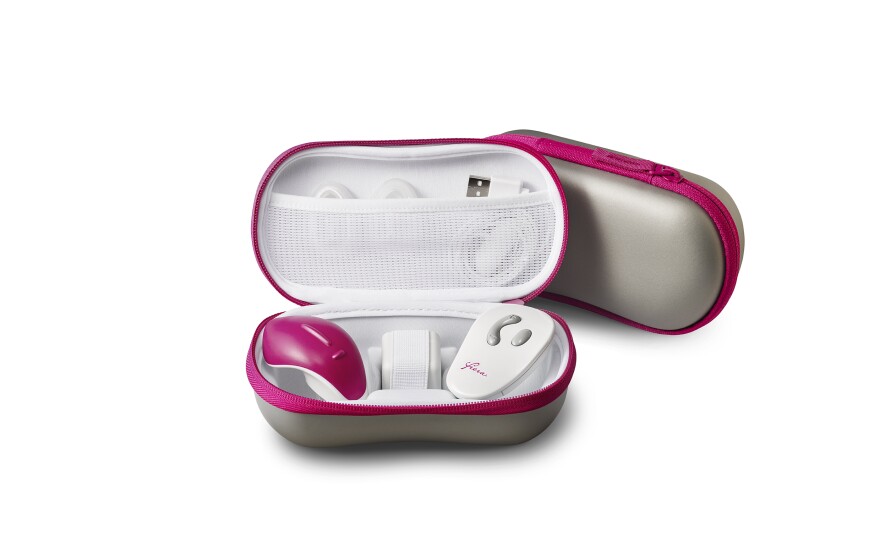According to some research, two of every five women have sexual concerns or difficulties at some point in their lives. Yet no one has been able to create the “female viagra.” The most recent attempt, a pill called Addyi hasn’t met expectations. Still, big pharmaceuticals and startups are trying to tap into the female sexual health market.
Jennifer Buck and her husband always had a good, intimate relationship.They had two young kids and lived in a house near Flower Mound with their dog. Then, last year, when Buck was 37, she had to have a hysterectomy. When she lost her uterus, she says, it’s like her sex drive went with it.
“Now, not only was I stressed about being a mom and working,” she says, “But now there’s the whole hormone issue of I don’t really want to have sex.”
Buck says it was putting a serious strain on her relationship. She was avoiding physical contact altogether — even cuddling — and she could tell her husband felt responsible for them drifting apart.
“When he did finally say something to me, it broke my heart,” she says. “Because it wasn’t him.”
Up to 40 percent of women struggle with sex
There are a lot of women like Buck. Dr. Joseph Schaffer, chief of gynecology at UT Southwestern Medical Center in Dallas says up to 40 percent of women struggle some type sexual dysfunction. That can mean problems with pain, arousal, or orgasm.
“It is something people haven’t freely talked about in the past,” Schaffer says. “It's only recently that people have come to understand how this can affect someone’s quality of life.”
The causes of decreased sexual arousal can be tough to unravel. Schaffer says sometimes hormones or creams can help, sometimes counseling or physical therapy — often times, a combination of approaches is necessary. What he does know is female sexual health is an untapped market — and startups are hoping to get in.
Startups like Nuelle.
Jennifer Buck, practice manager for Dr. Sylvie Paroski at Women's Wellness at Flower Mound, told her doctor she didn’t want to take additional hormones to try and help with sexual arousal. Instead, she ended up experimenting with a small device called Fiera.
Fiera is the size and shape of a small computer mouse. It has disposable silicone seals that create a suction when placed around a woman’s genitals. The company that makes it, Nuelle, claims it enhances blood flow — aiming to do what Viagra does for a man with a device instead of a pill. Buck has been using it for three months, putting it on for five minutes before getting intimate with her husband.
Marketing women's sexual health is tricky
Entrepreneurs are coming up with all kinds of ideas for women’s gynecological health. Turning those ideas into products hasn’t been easy. Karen Long is CEO of the company that created that device. She’s a Silicon Valley veteran. But pitching to venture capitalists this time was a lot harder than she expected.

“They listened very politely,” she says, “but tried not to look me in the eye because I’m talking about women and sexual function.”
Rebecca Posten, CEO of Prevaleaf, is another businesswoman who initially had trouble attracting investors. Posten, who lives in Dallas, used to be an OBGYN before starting Prevaleaf. The company sells natural products, like creams, primarily for women going through menopause.
Posten points out it’s not just men who are often uncomfortable talking about gynecological issues; plenty of women don’t share those kinds of details, even with friends. That makes marketing products, say on social media, really tricky.
“It’s not easy to get a woman to ‘like’ your page if you’re talking about gynecological products,” Posten says.
Still, investment in women’s sexual health companies has steadily increased. Some are developing drugs for FDA approval. Others, like Nuelle, are trying to reach a broader audience and not labeling themselves as a treatment or medical device. Dr. Joseph Shaffer warns some new products don’t have clinical trials proving their safety or efficacy, so consumers should be careful. And when it comes to sexual arousal for women, he says, don’t expect a miracle cure like Viagra.
“Any one therapy is not going to be able to successfully treat the large category of female sexual dysfunction.”
For Jennifer Buck, a combination of hormone therapy — to stabilize her mood — and the wearable device to get her in the mood, has helped. She hopes by sharing her story she can help other women feel less alone.






